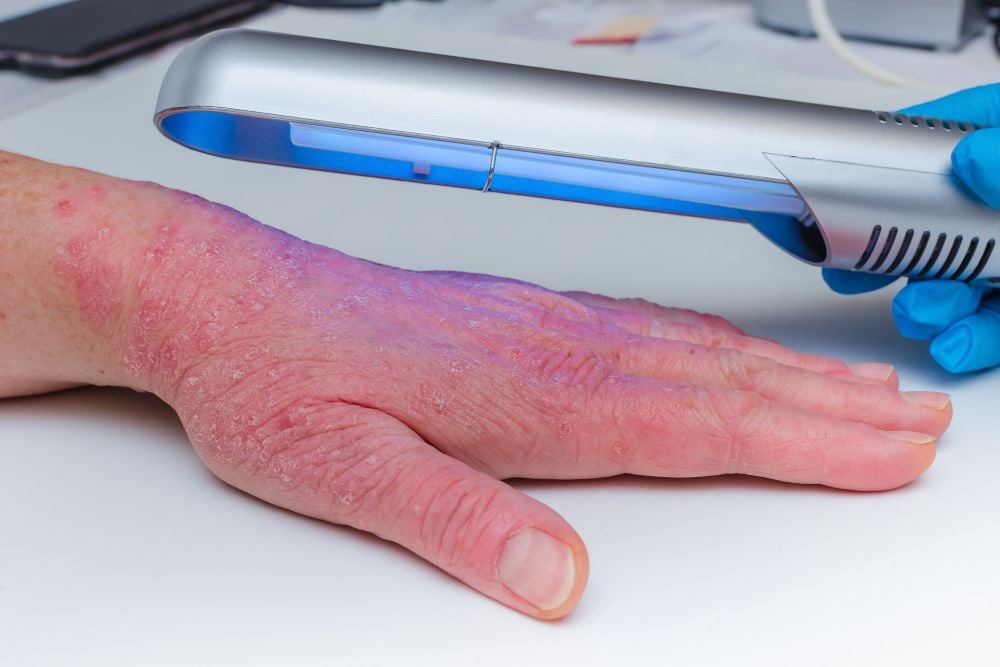Phototherapy and photochemotherapy - Skin Specialist in Dubai at DRHC
Psoriasis is a chronic autoimmune condition that affects the skin, causing an overproduction of skin cells. While there is no known cure for psoriasis, various treatments, such as phototherapy and photochemotherapy, have shown promising results in managing the symptoms. These therapies involve the controlled exposure of the skin to specific types of ultraviolet (UV) light, either with or without the use of light-sensitizing medications. Understanding the intricacies and benefits of phototherapy and photochemotherapy is crucial for individuals seeking effective management of their psoriasis symptoms.
Phototherapy and photochemotherapy are both effective treatment options for psoriasis.
Phototherapy:
Phototherapy, also known as light therapy, involves exposing the affected skin to specific wavelengths of ultraviolet (UV) light. The most commonly used types of phototherapies for psoriasis are:
UVB therapy:
This involves exposure to UVB light, which can improve skin symptoms and reduce inflammation. UVB therapy can be administered in different ways, such as narrowband UVB (NB-UVB) or broadband UVB (BB-UVB).
UVA therapy:
UVA (psoralen plus UVA) involves combining a medication called psoralen with UVA light exposure.
Treatment sessions are carefully supervised to minimize the risk of adverse effects, such as sunburn or skin damage.
Phototherapy may require multiple sessions over several weeks or months to achieve optimal results.
Photochemotherapy (PUVA):
Photochemotherapy combines the use of a psoralen medication with UVA light exposure, hence the term PUVA therapy. Psoralen can be taken orally or applied topically before UVA exposure.
The medication makes the skin more sensitive to UVA light, leading to improved symptoms and reduced inflammation. PUVA therapy is generally more effective than UVB therapy for patients with severe psoriasis, particularly for those who do not respond well to other treatments. It can also be helpful for psoriasis affecting the palms, soles, or nail beds. However, PUVA therapy may carry some risks, such as an increased risk of skin aging, sunburn, and skin cancer due to UVA exposure. Regular skin monitoring and precautions, such as protective eyewear and sunscreen, are necessary during and after treatment.
Benefits of Phototherapy and Photochemotherapy:
Controlled exposure to UV light can effectively slow down the rapid growth of skin cells, leading to a reduction in psoriasis symptoms.
Phototherapy and photochemotherapy have shown significant improvements in various types of psoriasis, including plaque, guttate, and palmoplantar psoriasis.
These treatments are often well-tolerated and can provide long-term relief from psoriasis symptoms, improving the overall quality of life for patients.
At the Dr. Rami Hamed Center, our Experts are committed to providing the Best and Effective dermatological care extends to our comprehensive approach to managing psoriasis. Through the integration of advanced phototherapy and photochemotherapy treatments and the expertise of our dermatology specialists in Dubai
.png?width=281&height=59&name=bookanappointment%20(1).png)
Dermatology Clinic Dubai at Dr. Rami Hamed Center provides one of the top dermatologists in Dubai for the treatment of various skin-related diseases. If you are looking for a good skin doctor in Dubai, call +97142798200. Skin Care & Treatment Clinics in Dubai. DRHC also offers PRP treatment, Fillers, etc. DRHC provides technological treatment for anti-aging and rejuvenation procedures by the best Dermatologist in Dubai.




.png?width=281&height=59&name=bookanappointment%20(1).png)




